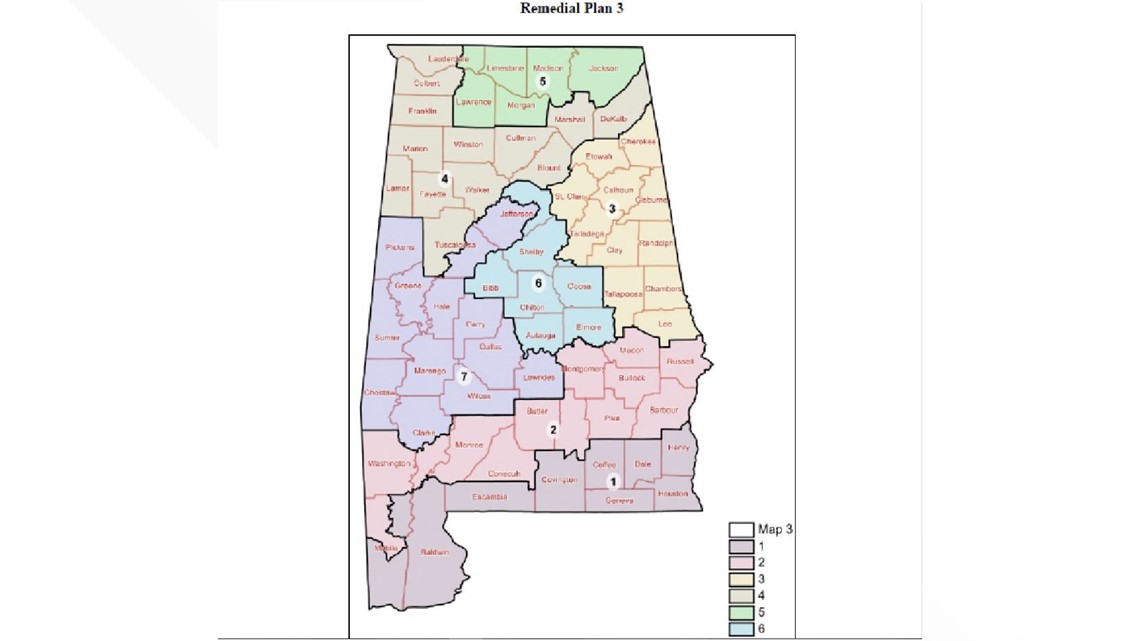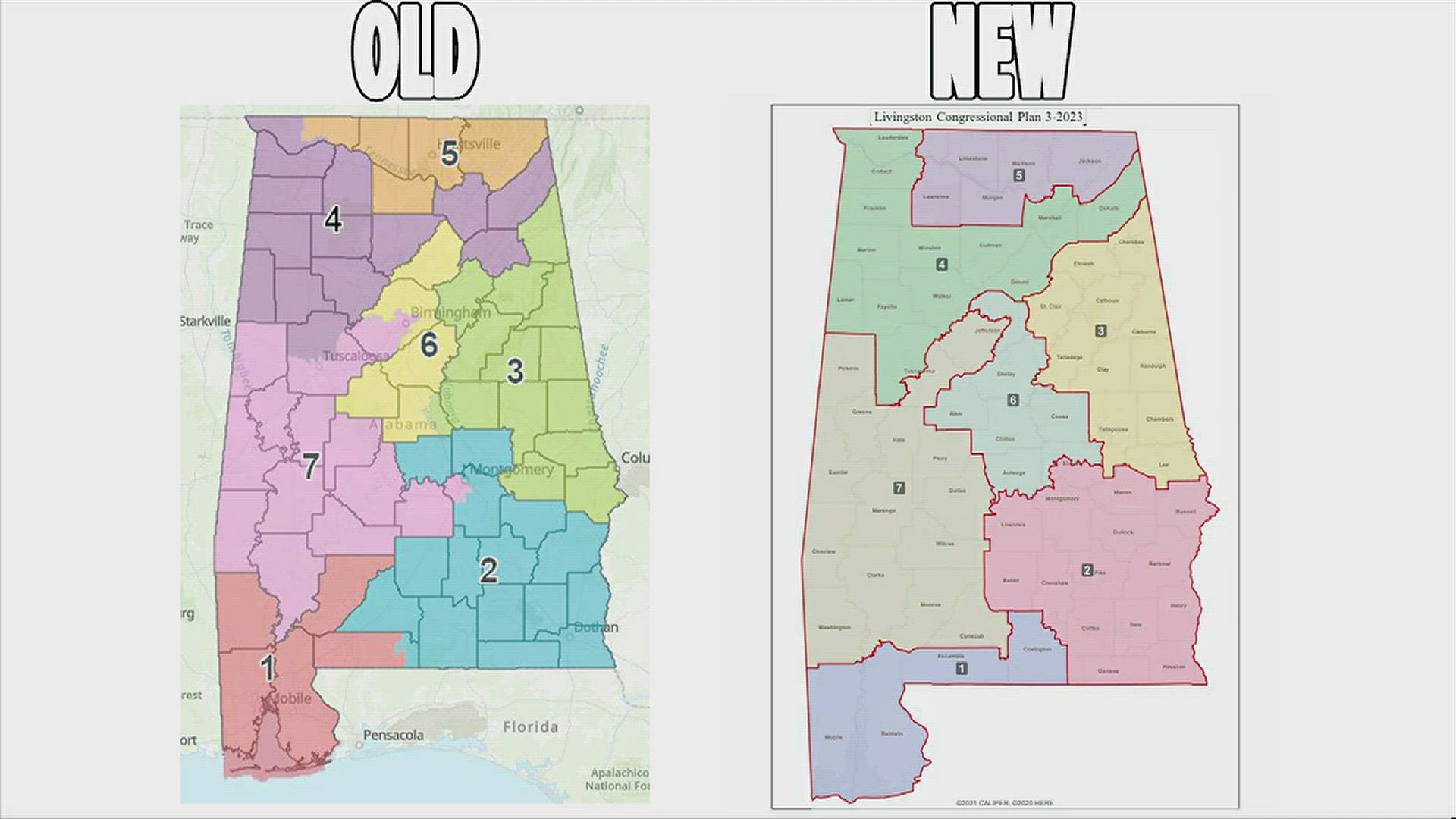MONTGOMERY, Alabama — After months of negotiations and court battles following a U.S. Supreme Court order that Alabama redraw its legislative maps to include a second majority Black district, a three-judge panel has selected one of the three "remedial maps" submitted by the Special Master appointed to the case.
In its decision, the panel said, "These congressional redistricting cases are before this Court for us to order the Secretary of State to conduct Alabama’s congressional elections according to a districting plan that remedies racially discriminatory vote dilution that we found and the Supreme Court of the United States affirmed in Alabama's previous plan."
Those cases allege that Alabama's 2021 redistricting plan was "racially gerrymandered in violation of the United States Constitution and/or diluted the votes of Black Alabamians in violation of Section Two of the Voting Rights Act of 1965." The Supreme Court agreed, upholding a district court ruling that the congressional district maps Alabama approved in 2021 violated the Voting Rights Act.
The October 5, 2023 decision by the three judge panel puts in place a map that satisfies the order of the court to include a second district that is a majority-Black district or a district "in which Black voters otherwise have an opportunity to elect a representative of their choice," and that any remedial plan "will need to include two districts in which Black voters either comprise a voting-age majority or something quite close to it." The remedial maps were drawn by a Special Master, cartographer, and Special Master's counsel after the Alabama state legislature failed to submit a map that complied with the Supreme Court's order and the Supreme Court rejected a stay requested by the State of Alabama.


Reactions
The Alabama Secretary of State's Office, in a statement hours after the ruling, stated:
“The Office of the Secretary of State will facilitate the 2024 election cycle in accordance with the map the federal court has forced upon Alabama and ordered us to use. It is important for all Alabamians to know that the legal portion of this process has not yet been completed. A full hearing on the redistricting issue will take place in the future and I trust Attorney General Marshall to represent Alabama through that process. In the meantime, I will keep our state’s elections safe, secure and transparent because that is what I was elected to do.”
The Alabama Republican Party issued a statement on the ruling, reading:
"While we continue to have the utmost respect for the legal process, we are disappointed with the decision the District Court has reached. Of the three maps, the Court chose the map that is the most Democratic – not the map with the highest minority voting age population. We are hopeful Alabama Attorney General Steve Marshall will continue with the appeal process. We believe Alabama's Congressional Districts should represent the communities of our state, and not be based on the liberal Democrat agenda or the color of people's skin."
7th District Rep. Terri Sewell (D) also released a statement, reading:“
After numerous hearings, three Supreme Court rulings, and unprecedented defiance by state officials, the voters of Alabama finally have a fair congressional map! While we celebrate this historic victory, the continued resistance that we face from state officials should not be lost on anyone. This long and arduous battle over Alabama’s congressional map serves as a solemn reminder that efforts to deny fair representation to Black and minority voters are still alive and well. Now more than ever, we must restore the FULL protections of the Voting Rights Act. We need the John R. Lewis Voting Rights Advancement Act and we need it now.”
“We’re glad to see that process result in a federal court selecting a map that allows all, all the people of Alabama to have their voices heard,” White House press secretary Karine Jean-Pierre said Thursday.
The court-ordered lines in Alabama come as redistricting cases are pending in Louisiana, Georgia and elsewhere. Former U.S. Attorney General Eric Holder, chairman of the National Democratic Redistricting Committee, said other states should view the Alabama decision as an example of “basic fairness” and a “warning that denying equal representation to Black voters, violating the Voting Rights Act, and defying federal court orders is a direct tie to an odious past and will no longer be tolerated.”
Under the new map, District 2 will stretch westward to the Mississippi border, taking in the capital city of Montgomery, western Black Belt counties and part of the city of Mobile. It used to be concentrated in the southeast corner of the state. Under the new map, Black residents will comprise 48.7% of the voting-age population. The special master said an analysis showed that candidates preferred by Black voters would have won 16 of 17 recent elections in the revamped district.
The new map could pit two current Republican congressmen against each other in 2024, and also draw a crowded field vying for the revamped District 2. Moore’s home is now in District 1, currently represented by Republican Rep. Jerry Carl. Moore could move back to District 2 to run, or try to challenge Carl, who is running again. Moore said Thursday that he is “prayerfully” weighing what to do.

